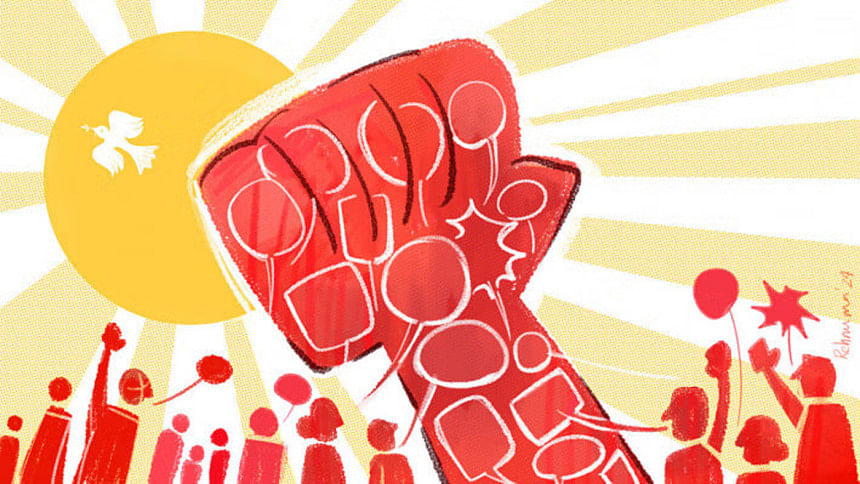The Passive Revolution of July 2024

On 5 August 2024, the then Prime Minister Sheikh Hasina fled to India in the face of a nationwide uprising led primarily by students. This brought a dramatic end to Hasina's authoritarian regime. The UN Human Rights Office Fact-finding Report on Bangladesh confirms that to supress the uprising, law enforcement agencies, together with the country's security and intelligence apparatus as well as violent elements associated with the ruling party of the time, systematically killed at least 1,400 individuals, including several hundred children. The uprising soon came to be known and celebrated as the 'July revolution' and the 'monsoon revolution'.
What is a revolution?
A widely accepted general definition of revolution presents it as "the process by which visionary leaders draw on the power of the masses to seek to forcibly bring into existence a new political order" (Goldstone 2023). A combination of four elements – mass mobilisation, forcible overthrow of the government, the pursuit of a vision of social justice, and the creation of new political institutions – is what makes a revolution distinct from uprisings, peasant revolts, riots, military coups, civil wars, and social movements.
The term 'revolution' derives from the Latin revolutio, meaning to relapse, to revert, to be brought back, or to restore. In 12th century Europe, the idea of revolution as a kind of circular movement came primarily to describe the specific action of a celestial object rotating. After the 1381 Peasant's Revolts across England, the word revolution was rapidly referring to an alteration, change, or upheaval, and by 1521 the term had become interchangeable with that of rebellion – "the overthrow of established government or social order by people previously subject to it" (Kumar 2019). The Glorious Revolution of 1688 registers two opposing meaning of the term: on the one hand, it connoted radical political transformation and upheaval marked by the change from an absolute to a constitutional monarchy. On the other hand, this revolution was also deemed 'Glorious' in that it involved the restoration of the monarchy to its rightful place – a restitution of political and legal order.
It is the French Revolution of 1789 that fundamentally separated the concept of revolution from its cyclical etymological meaning to signify a singular and distinctive rupture with the past. Revolution would thereafter come to mean the fundamental, total, systematic, and radical social, economic, political, and legal change within a society, nation, and state. In particular, revolution became synonymous with rapture and radical change (Kumar 2019).
The July 'Revolution' between Cyclicity and Rupture
In the case of Bangladesh, it is still unclear whether the successful mass mobilisation in July and the ensuing overthrowing of the government in August would ultimately lead to an inclusive politics with respect for non-discrimination and social justice at its heart and whether new political institutions (not just political parties) would emerge to materialise alternative, pro-people political vision.
As soon as the Hasina government was toppled, political elites in Bangladesh had to grapple with the new reality. Senior political leaders of major political parties in opposition as well as civil society representatives were quick to call it a revolution in their speeches and interviews. Also, in a speech on 7 December 2024, the Chief Justice of Bangladesh recalled "the resolute spirit of the student-led revolution of July and August 2024, which catalysed the movement to oust oppression and restore justice, equality, and humanity".
However, major political parties soon refocused their energy on distancing themselves from what they themselves called a revolution. The scary thought of a revolution and the typical imagery that it brings along in the immediate aftermath – disruption, turmoil, demise of political structures they have ever known – was enough for them to disown the revolution, not to mention regional and international pressure and concerns. For them, even if this is a revolution, it must be in the cyclical sense – a process through which the 'fascist' regime has collapsed; the concern is how quickly politics can return to 'normalcy'? What major political parties opposed strongly is the possibility of any rupture or any discontinuity in the post-revolution political reimagination.
In such situations, political, bureaucratic, military, and other elites usually seek refuge under the protective wings of the law. Revolution is a not a legal concept per se, but when the legitimacy of a revolution is assessed within the framework of the law and when the question of legality and constitutional continuity becomes the paramount concern in the immediate aftermath of the revolution, the court becomes an important powerbroker or a 'Kingmaker' so to speak (Kumar 2016). A revolution generates its own legality, and it is rather a political decision to conceptualise the revolution within a legal framework. The elites in Bangladesh made that political decision and, thus, began the legal takeover of the July revolution.
In one of the first moves, a new attorney general was appointed on the 8th of August, apparently to foil an attempted judicial coup against the revolution. On the same day, under article 106 of the constitution, the President sought an advisory opinion of the Appellate Division regarding the formation of an interim government to fill the constitutional vacuum given that the Prime Minister had resigned on the 5th of August and the President had dissolved the Parliament the day after. In response, the Appellate Division opined that to address the constitutional vacuum, the President can appoint a Chief Advisor and other advisors to form an interim government. Although the Appellate Division does not specifically mention in their rather brief opinion, the premise of its opinion is of course the age-old 'doctrine of necessity', which is informed by Hans Kelsen's doctrine of revolutionary legality. Leading lawyers quickly extended their support to this reasoning (see an example here).
Interestingly, when the legality of the current interim government was challenged in a writ petition arguing that the July revolution should have brought forth a 'revolutionary government' under an instrument of Provisional Interim Constitutional Order, the High Court Division in its decision of February 2025 found the petition "misconceived, malicious and vexatious" and held that the interim government was backed by the aforesaid advisory opinion as well as by the will of the people. Then the court further noted: "The mass uprising that took place in July-August 2024 is a part of our history and hopefully this will remain in good care of the people for many years to come." In other words, for the court, it is a 'mass uprising' as opposed to a 'revolution' and it is already a matter of the past – a part of our 'history', as opposed to a history in making.
To make things even more complicated, international law has an important role in influencing the nature, form, and substance of a revolution, and its approach to the law. A combination of international recognition of the revolutionary government, continued international responsibilities of the state, and finally, its democratic commitment – all informed by international law – shape political choices of the protagonists of revolution in the midst of intense power negotiations with various local vested interest groups. Especially, transition to democracy remains an important aspect of post-revolutionary political discourse, and rightly so. It is often the lack of democratic culture that necessitates the revolution in the first place, although democracy cannot be reduced to mere electoral rituals in this context. Thus, a complex process of power negotiations against the backdrop of constitutional and international legal norms gives the revolution a character of cyclicity or rupture or a combination of both.
The July revolution is not unique in this sense. As a matter of fact, in this highly integrated global economic and political structures, marked by neoliberalism and geopolitical complexities, a revolutionary rupture is highly unlikely in a country like Bangladesh in the absence of a strong political will and consensus to go for major socio-political transformations. What we eventually ended up with is rather a 'passive revolution'.
The 'Passive Revolution'
With reference to the moment of the 'Resurgence' leading to the unification of the state of Italy (the Risorgimento), Antonio Gramsci argues in his 'Notes on Italian History' that if new claimants to power lack the necessary social and military capacity to subjugate hitherto dominant classes and establish complete hegemony over the new nation, they prefer an alternative mode of operation. They take a toned-down approach in line with the available social and military strength, in which their demands for a new society are "satisfied by small doses, legally, in a reformist manner – in such a way that it was possible to preserve the political and economic position of the old feudal classes" (Gramsci 1971). They themselves then emerge as the new bourgeoisie and embarks upon a 'passive revolution' by attempting a "'molecular transformation' of the old dominant classes into partners in a new historical bloc and only a partial appropriation of the popular masses, in order first to create a state [read government] as the necessary precondition for the establishment [or continuation] of capitalism as the dominant mode of production" (Chatterjee 1986).
The July revolution of 2024 indeed resembles Gramscian 'passive revolution' today. Various reform commissions have now submitted their reports. Preparations for a general election are underway. Soon a new democratically elected government will be in power, and the nation will return to some sort of 'normalcy' to give meaning to what we call a form of cyclicity. What is sadly missing in this process is a political reimagination – not just reform. This reimagination is not the task of the unelected interim government; this needed to come through a process of extensive dialogue amongst political parties – old and new, who unfortunately do not have much appetite for this process, it seems. Thus, we collectively sow the seed of yet another passive revolution probably not before long!
The writer is Professor of International Law and Human Rights at the University of Birmingham, UK ([email protected])

 For all latest news, follow The Daily Star's Google News channel.
For all latest news, follow The Daily Star's Google News channel. 



Comments